Argentina
Argentina. La DAIA acompaña la iniciativa de empresarios pymes de la comunidad judía en la donación de 200 mil barbijos
Agencia AJN.- Hoy se realizará una entrega importante de equipo de protección a la Municipalidad de Berisso. Dos semanas atrás, habían donado 15 mil barbijos para el Consejo Nacional de Coordinación de Políticas Sociales, y se han repartido materiales en hospitales, comedores y ONGs.
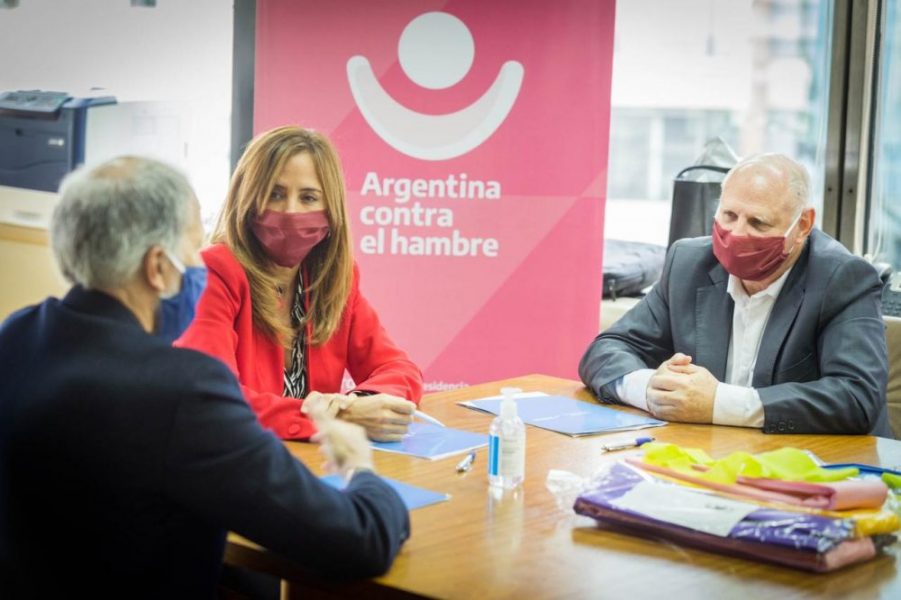
Agencia AJN.- Por una iniciativa de empresarios pymes de la comunidad judía argentina, con la colaboración de la Delegación de Asociaciones Israelitas Argentinas (DAIA), se comenzó a distribuir barbijos y otros equipos de protección a distintas instituciones, que van desde hospitales a ONGs. Debido a la pandemia, uno de los empresarios, dueño de una fabrica textil, impulsó la acción solidaria aprendiendo a fabricar estos artículos, de extrema necesidad en la lucha contra la pandemia del coronavirus.
Desde el inicio de la cuarentena decretada por el Gobierno argentino para frenar el avance del COVID-19, el empresario Marcelo Nabel comenzó a producir barbijos y camisolines médicos, no sólo con un objetivo comercial debido a la demanda de estos productos, sino con fines solidarios, ya que una parte de los fabricado es donado a hospitales, comedores comunitarios y ONGs. «Esto surgió a fines de marzo, cuando estábamos todos en cuarentena. Un amigo me dijo ‘ponete a hacer barbijos’. Ni siquiera sabía cómo eran, así que compramos uno y nos pusimos a inventarlo, fuimos aprendiendo», relató a la Agencia AJN Nabel, quien convocó a participar en la iniciativa al ex presidente del club Macabi Buenos Aires, Marcelo Dborkin.
Lo cierto es que de los 500 mil barbijos que produjeron en dos meses, unos 200 mil fueron donados a hospitales públicos, merenderos y otras instituciones a partir de una mediación de la DAIA, que motorizó en cierta medida la iniciativa.
Hoy, Nabel junto a una delegación de la DAIA, encabezada por su presidente Jorge Knoblovits, y las delegaciones de La Plata y Berisso de la representación política de la comunidad judía argentina harán entrega de una nueva donación de barbijos en la Municipalidad de Berisso, en la provincia de Buenos Aires. «El objetivo es ayudar a la gente a paliar esta situación generada por el coronavirus», afirmó Nabel.
«Esperamos que esto continúe», expresó por su parte Knoblovits, en declaraciones a la Agencia AJN, tras destacar el espíritu de la iniciativa solidaria.
Nabel como gran parte de los sectores comerciales de la Argentina, fue afectado por las restricciones dispuestas por el Estado para evitar una propagación del virus, que ya provocó la muerte de más de 400 personas con casi 10.000 casos diagnosticados en el país.
Siempre en diálogo con esta agencia, Nabel dijo que «en principio lo pensamos para vender barbijos, que es lo que necesitábamos en ese momento», con la misión de atender la emergencia cuando en Europa crecía el número de fallecidos y de infectados por el virus. Para colaborar con el proyecto.
«Cuando tuvimos la idea de donarlos, contactamos a Jorge Knoblovits para hacer una donación a distintas instituciones o ONGs a través de la DAIA. Mañana lo que vamos a hacer es una donación, pero ya donamos a diferentes instituciones en este tiempo», precisó el empresario.
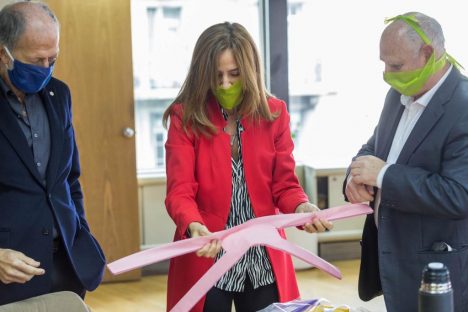
Justamente como parte de este plan, la empresa pyme junto a la DAIA donaron al Consejo Nacional de Coordinación de Políticas Sociales 15 mil barbijos.
Tal como ocurrirá mañana, la donación fue entregada por Knoblovits y Nabel a la titular del Consejo, Victoria Tolosa Paz, quien resaltó que «esto se da en el marco de cooperación con el nuevo protocolo de prevención contra el coronavirus para cocinas y comedores comunitarios».
Nabel explicó que la primera donación se realizó a la Comunidad Bet El, que preside Martín Maslo, y que asiste a distintos merenderos. «En aquella ocasión llevamos 10 mil barbijos para que distribuya», recordó.
«Me gusto mucho la recepción y la idea. Por eso comencé a contactarme con distintos grupos vinculados a hospitales y diferentes instituciones a las que consultamos si estaban interesadas en recibir una donación. Así llegamos a distintos lugares, centros de alimentación, iglesias, merenderos», agregó el empresario pyme.
Nabel aseguró que «la gente queda muy agradecida, son lugares donde se necesitan. Voy personalmente a entregarlo la mayoría de las veces y en los merenderos nos agradecían».
«La gente de la empresa está sumamente agradecida porque en vez de estar mirando la televisión están laburando, están cosiendo. Nuestra idea no es hacer plata con esto, por eso vendemos una parte y donamos otra. No buscamos sacar rédito del COVID, sino ayudar», enfatizó el empresario pyme.
Argentina
Argentina | Holocaust and Heroism Day. President Milei’s major speech against anti-Semitism and terrorism
»Therefore, in keeping with our history and with what we consider to be true, we ratify today our spirit of friendship and collaboration with the State of Israel and we offer Argentina’s candidacy for the International Presidency of the IHRA», expressed Milei.
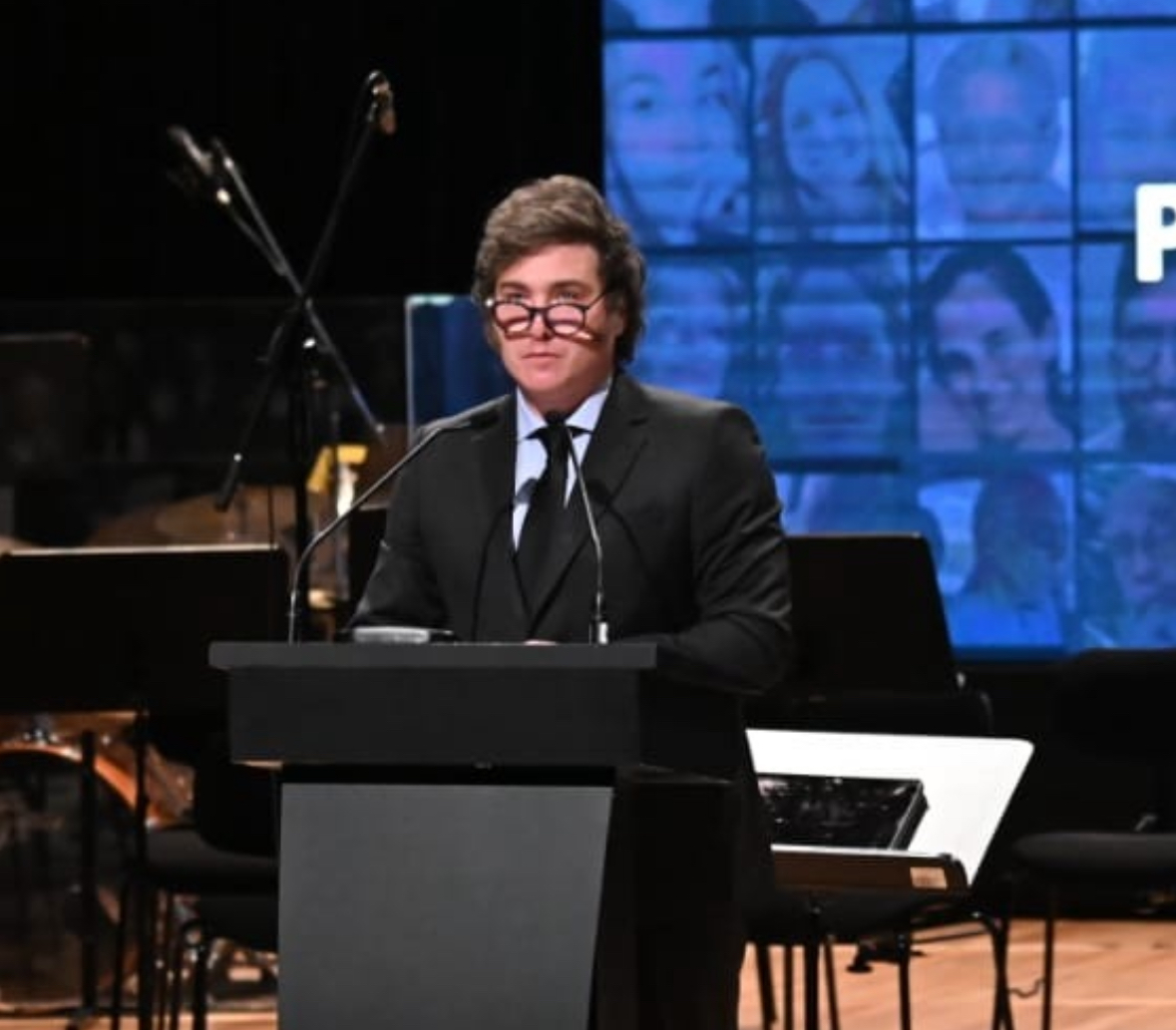
Agencia AJN.- At an event organised on Wednesday by the Delegation of Argentinean Israelite Associations (DAIA) and the Holocaust Museum of Buenos Aires to commemorate Holocaust and Heroism Day, the 81st anniversary of the Warsaw ghetto uprising, President Javier Milei announced ‘Argentina’s candidacy for the presidency of the International Holocaust Remembrance Alliance’ (IHRA).
The IHRA is an intergovernmental organisation of 35 states whose aim is to combat acts of anti-Semitism, intolerance and discrimination that can lead to genocides such as those experienced by humanity in the 20th century.
The main event was also attended by Nazi survivors, relatives of people kidnapped by Hamas, national, provincial and municipal authorities, judges, political leaders, diplomats, representatives of different religious denominations, community leaders, among others.
Argentina. Discurso y anuncio del presidente Javier Milei en el acto del Día del Holocausto organizado por el Museo del Holocausto y la DAIA @JMilei @DAIAArgentina @museoshoa #HolocaustRemembranceDay #YomHaShoah @Isaac_Herzog @AmbEyalSela @netanyahu #israel @israelmfa… pic.twitter.com/8uQVSq1inE
— Agencia AJN (@AgenciaAJN) May 9, 2024
President Milei’s full speech:
At the outset, I would like to pay tribute to Lior Rudaeff, an Argentinean living in Israel who was kidnapped and murdered by the Hamas terrorist organisation on 7 October. I would like to extend my sincere condolences to his family and loved ones, and call for the return of his body so that he can be given a proper farewell by them. Baruch Dayan Haemet to him and to all the victims of Islamic terrorism in Argentina and the world.
Today more than ever there can be no doubt that the scourge of Islamic terrorism on Israel and the Jewish people is not a problem alien to us Argentines, but one that affects us directly. First, because 21 Argentines were murdered by Hamas on that tragic day, 20 more Argentines were kidnapped and today, seven months after the attack, there are at least eight compatriots for whom we still do not know whether they are still among us or whether they have passed on to another life. Secondly, because when a battle is fought between good and evil, between freedom and oppression, between civilisation and barbarism, taking sides is not one option among others but a moral obligation.
Today we are here to remember perhaps the greatest tragedy in the history of mankind, we are doing so under the name of Holocaust and Heroism Day, and I would like to pause to discuss with you this second concept, heroism. Because I believe that the heroism and virtue of men is the flip side of tragedy, it is the only thing that can make the righteous prevail over those who seek to oppress them and rob them of their freedom. And because I believe that in times of darkness, when speaking out is costly and when the majority prefer to turn their backs on righteousness for their own convenience, promoting virtue is a commandment and a duty.
We remember today the Jewish resistance in the Warsaw ghetto, where 300,000 souls were imprisoned in inhumane conditions for three years by the Nazi regime, only to be transferred to extermination camps as we all know. We remember that one day in 1943 the prisoners took what few weapons there were and put up a fight. For 27 days they fought for their freedom, under unequal conditions and with virtually no chance of success. They fought for their freedom, which is a just cause in every time and place, and they chose to die fighting rather than be killed.
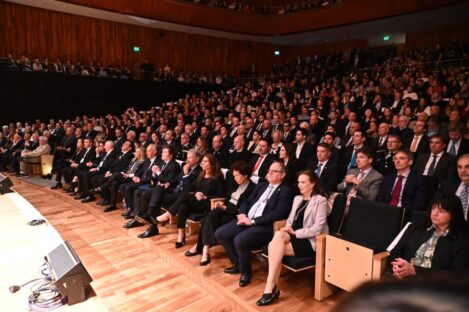
The struggle for freedom against adversaries always more powerful than themselves has been a constant in the history of the Jewish people, and has forged for them a heroic spirit, a warrior spirit. This is already clear in the sacred scriptures, it is seen in the exodus of the Jewish people from Egypt, escaping from the yoke of Pharaoh, leaving behind slavery to embrace freedom. The revolt of the Maccabees is clear when, despite being in a distinct minority, the least against the most, the weak against the powerful, they drove out the Greek invader and recaptured Jerusalem. It was never the number of soldiers that mattered, but the forces that came from heaven.
Fighting battle upon battle for over 4,000 years, though many were lost and though the temple in Jerusalem was destroyed twice, the Jewish people persisted. And today again, being under threat, surrounded by enemies who pursue a goal akin to the goal of those who imprisoned more than 300,000 souls in the ghetto 80 years ago, because the intention of Hamas on 7 October was the same as that of the Nazis, to directly and deliberately murder innocent people, if they did not do it on a larger scale, it was not because they did not want to but because they could not.
Today, we see in parallel to these sad events a recognition in the world of both intolerant Islamic fanaticism and anti-Semitism in its different versions. And to make matters worse, we see how all these phenomena are not perceived by the free world with the sharp condemnation and firm action they demand, but with discomfort and ambiguous gestures. I look around me at the rest of the leaders of the free world, especially the leaders of the great nations that should be the pillars of global freedom, and I see indifference in some and fear in others to stand on the side of truth.
Today the world is silent while there are still more than 100 hostages suffering, eight of whom are fellow Argentines. Not to mention the blatant anti-Semitism that has become commonplace on the campuses of educational institutions entrusted with the professional and human training of the West’s elites. I believe that the heroism we talk so much about and want to promote is also to defend the truth, to speak the truth when around us the truth is silenced.
That is why when the world is silent, we have an obligation to speak out, because it is the silence of the good that allows the barbarity of the bad, and because speaking out, looking straight and not turning a blind eye, even though it is difficult, even though for many it is inconvenient, is the only way to ensure that the Shoah is not repeated.
Emotivo acto del Día del Holocausto en Argentina con la presencia del presidente @JMilei organizado por @museoshoa y @DAIAArgentina.@JKnoblovits @CancilleriaARG @mondino @IsraelMFA @JonathanPeled @Isaac_Herzog @netanyahu @AmbEyalSela @LiorHaiat @BringThemHome23 #Israel pic.twitter.com/4gau1RIqiR
— Agencia AJN (@AgenciaAJN) May 9, 2024
And because God will not accept justifications or exculpations when it comes to rendering his ultimate judgement, we will not be able to tell him what, but I could not or what virtue was not convenient at the time, he will not judge us for what we thought, believed or wanted, but for having done the right thing in life. That is why today remembering the Shoah, remembering heroism and denouncing Islamic terrorism is an obligation, because without heroes we are defenceless in the face of an ever darker and longer night.
In closing I would like to thank Marcelo Mindlin, Jorge Knoblovits and the rest of the authorities of the DAIA and the Holocaust Museum for organising and inviting me to be part of this commemoration at such a difficult time for the Jewish people that demands that we all work back-to-back.
I also want to tell you that Argentina is a historic friend of the Jewish people. We were the first country in the region to recognise the existence of the State of Israel and today we proudly have the largest Jewish community in Latin America and the tenth largest in the world. Together with the Jewish community, we have suffered the cowardly attacks by the Iranian government, not only on the Jewish-Argentine community, but on the Argentinean people as a whole, which, thanks to the persistent efforts of those who seek the truth, are now, three decades later, beginning to be clarified.
Therefore, in keeping with our history and with what we consider to be true, we ratify today our spirit of friendship and collaboration with the State of Israel and we offer Argentina’s candidacy for the International Presidency of the IHRA (video), an institution whose value takes on new relevance and urgency every day, at a dark time, when the rest of the world is turning its back on Israel, they will find us at their firm side always.
Finally, and lastly, I would like to conclude with a letter from Rabbi Samson Raphael Hirsch, which seems to me to be very pertinent to the times we are living in and which should be present in our lives every day. This letter says: ‘Those who are convinced that their opinions are true and correct must express them constantly and at every opportunity with candour, and without regard to the degree of support they have and the level of opposition they will encounter. Lies need supporters to succeed; lies need the authority of majorities to fill what they lack in the rightness of their argument. Truth, on the other hand, will always win out in the end. Even if it takes time, noble, courageous and pure, expressed with all the ardour of conviction and with all the clarity of a sure conscience, expressed again and again on every occasion, it will eventually win the respect and esteem of even those who refuse to accept it. The only truth that has been lost without the possibility of regaining it is that whose possessors have not the courage to speak frankly of it. Truth was never defeated by the forces of resistance, it was only defeated when its possessors were too weak to defend it’.
Thank you very much.
Argentina
En el Día del Holocausto, Milei anunció la postulación de Argentina para la presidencia de la IHRA
Agencia AJN.- “El flagelo del terrorismo islámico sobre Israel y sobre el pueblo judío no es un problema ajeno a nosotros, los argentinos”, expresó el presidente en el acto central organizado por la DAIA y el Museo del Holocausto.
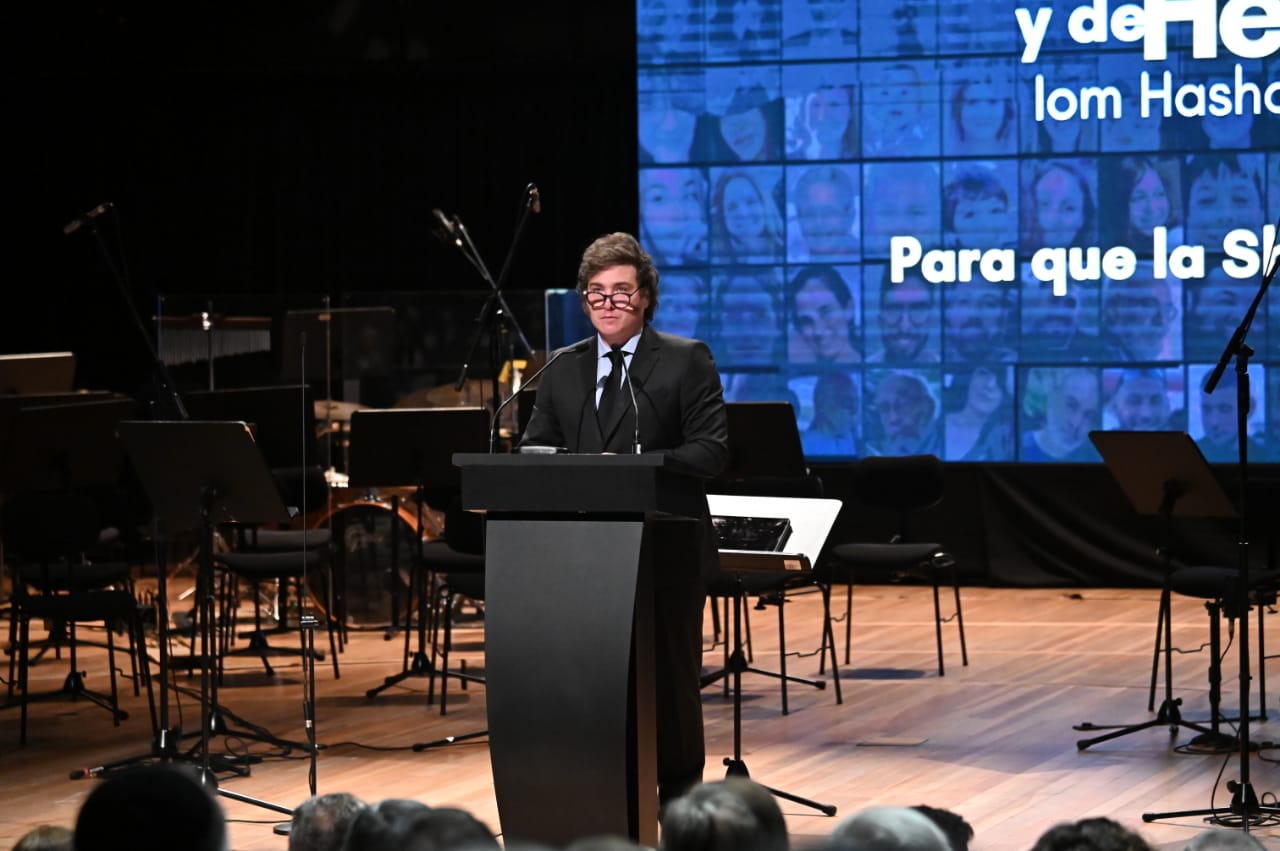
Agencia AJN.- En el acto organizado por la DAIA y el Museo del Holocausto de Buenos Aires para conmemorar el Día del Holocausto y del Heroísmo, en el 81° aniversario del levantamiento del gueto de Varsovia, el presidente Javier Milei anunció ayer en el ex Centro Cultural Kirchner (CCK) “la postulación de Argentina para la presidencia de la Alianza Internacional para el Recuerdo del Holocausto” (IHRA, por sus siglas en inglés).
Milei destacó que “cuando se libra una batalla entre el bien y el mal, entre la libertad y la opresión y entre la civilización y la barbarie, tomar partido no es una opción entre otras sino una obligación moral. Hoy estamos aquí para recordar quizás la tragedia más grande de la historia de la humanidad”. Y agregó: “Dios no va a aceptar justificación en su juicio único, no nos va a juzgar por lo que creíamos, sino por lo que hicimos. Denunciar el terrorismo islámico es una obligación».
Argentina. Discurso y anuncio del presidente Javier Milei en el acto del Día del Holocausto organizado por el Museo del Holocausto y la DAIA @JMilei @DAIAArgentina @museoshoa #HolocaustRemembranceDay #YomHaShoah @Isaac_Herzog @AmbEyalSela @netanyahu #israel @israelmfa… pic.twitter.com/8uQVSq1inE
— Agencia AJN (@AgenciaAJN) May 9, 2024
“El flagelo del terrorismo islámico sobre Israel y sobre el pueblo judío no es un problema ajeno a nosotros, los argentinos. Esto nos afecta de forma directa, primero porque 21 argentinos fueron asesinados por Hamás en aquella jornada trágica. 20 argentinos más fueron secuestrados y hoy, a 7 meses del atentado, hay al menos 8 compatriotas, para quienes seguimos desconociendo si están aún entre nosotros o han pasado a otra vida”.
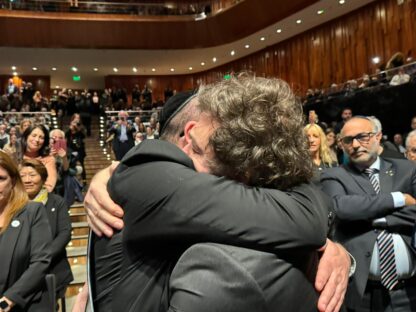
Abrazo del presidente Javier Milei con su maestro y embajador argentino en Israel, Axel Wahnish.
El presidente de la Nación advirtió que “la intención de Hamas el 7 de octubre fue la misma que la de los nazis, asesinar directa y deliberadamente gente inocente” y que “no hacer la vista gorda es la única manera de que la Shoá no se repita”.
La IHRA es una organización intergubernamental conformada por 35 Estados cuyo objetivo es luchar contra los actos de antisemitismo, intolerancia y discriminación que puedan conducir a genocidios como los vividos por la humanidad en el siglo XX.
Discurso del Presidente Javier Milei en el acto en conmemoración del Día del Holocausto y del Heroísmo. pic.twitter.com/4ePWWbuCnc
— Oficina del Presidente (@OPRArgentina) May 9, 2024
El acto central contó también con la presencia de sobrevivientes del nazismo, familiares de personas secuestradas por Hamás, autoridades nacionales, provinciales y municipales, jueces, referentes políticos, diplomáticos, representantes de distintas confesiones religiosas, dirigentes comunitarios, entre otros.
En el inicio del acto los sobrevivientes del horror nazi Mariette Diamant, Hélène Gutkowski, Claudia Piperno, Ruth Marshal, Josette Laznowski y Eva Dicker, encendieron seis velas en memoria de las 6 millones de víctimas. Néstor y Dana Chimiel, tío y prima de Iair y Eitan Horn, quienes aún se encuentran cautivos en Gaza, encendieron una vela en recordación de las personas masacradas por el grupo terrorista en octubre pasado.
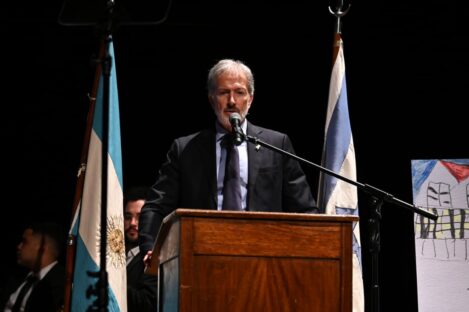
Presidente de la DAIA
En su discurso, el presidente de la DAIA, Jorge Knoblovits, recordó que «la Shoá no es un tema judío. Es un infierno abierto en el corazón de la historia», y agregó que «como en un siniestro dejá-vu, el mundo acaba de presenciar, azorado, la masacre del 7 de octubre».
«Quien se desentiende del espanto está enarbolando esa indiferencia cómplice, esa supuesta neutralidad que lo deshumaniza y lo pone del lado de los asesinos. Quien no levanta la voz y no se pone del lado de las víctimas, multiplica el crimen. Es peor todavía, porque ignora, irresponsablemente, la amenaza que está sobre su propia cabeza», afirmó el titular de la entidad representativa de la comunidad judía argentina.
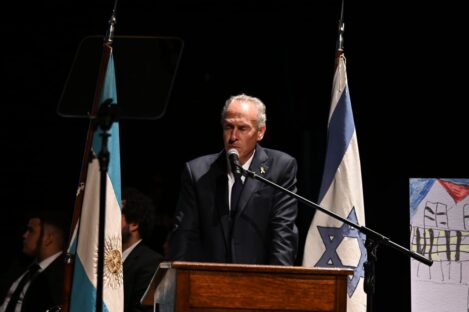
Presidente del Museo del Holocausto
Por su parte, el presidente del Museo del Holocausto, Marcelo Mindlin, ratificó «en este año tan difícil, que el Museo invita nuevamente a todos y cada uno de ustedes a realizar acciones en conjunto con cada una de las organizaciones que representan, para concientizar, para educar y para fortalecer los vínculos con todos los ámbitos de nuestra sociedad. Todos podemos hacer algo. Muchos ya lo están haciendo. Otros se han sumado en el camino. Hay mucho por hacer. Lo único que no podemos hacer, es no hacer nada. Aquí estaremos para multiplicar los esfuerzos de manera coordinada, porque las circunstancias así lo exigen».
En este marco, el cantante Juan Rodó interpretó el Himno Nacional Argentino y Hatikva, el himno nacional del Estado de Israel, acompañado por la Orquesta Sinfónica Juvenil Nacional José de San Martín y al Coro Polifónico Nacional.
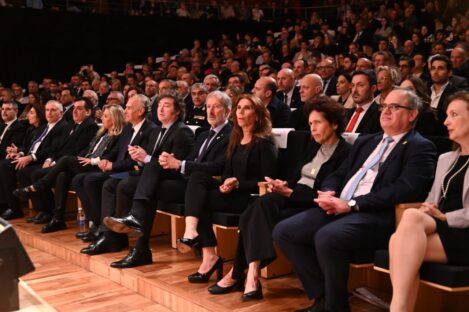
Además, frente a más de dos mil personas, el director de orquesta Ángel Mahler presentó una obertura musical dedicada a las víctimas de la Shoá y a las personas asesinadas el 7 de octubre en el ataque terrorista contra el Estado de Israel.
Durante el acto, el actor Franco Rovetta realizó una performance en homenaje al artista Marcel Marceau, «el mimo más famoso del mundo», recordado por haber salvado a cientos de niños durante la Segunda Guerra Mundial.
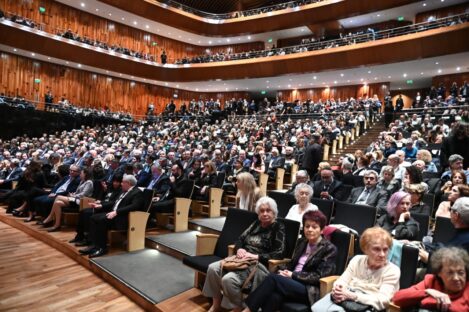
Asimismo, el sobreviviente Pedro Roth, artista plástico, fotógrafo y realizador cinematográfico nacido en Budapest, compartió su historia y el significado que el arte tiene para su vida.
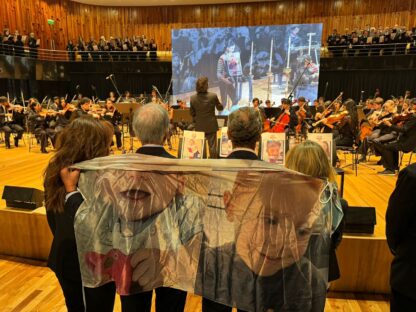
El ministro de Seguridad porteño, Waldo Wolff, entregó al presidente de la DAIA un manto con la cara de Kfir Bibas, el bebé secuestrado por Hamás
Roth subrayó que «el arte y la cultura son herramientas que me han dado la posibilidad de relatar, de vivir. A través de mis pinturas puedo contar, relatar lo sucedido. Una forma de descarga a través de lo que recuerdo. Un puente entre ese pasado y este presente. Quiero dejar un mensaje de recuerdo y resistencia. En estos tiempos del mundo tan sensibles para el pueblo judío, estar acá hoy es un acto valiente e imprescindible. Recordamos hoy a las víctimas y a los sobrevivientes que, con sus historias, mantienen viva la memoria para que nunca vuelva a suceder». Al finalizar su discurso el artista firmó uno de sus dibujos en el escenario.
La ceremonia finalizó con el cuadro musical Habaita («A casa» en hebreo), y el Himno de los Partisanos.
-
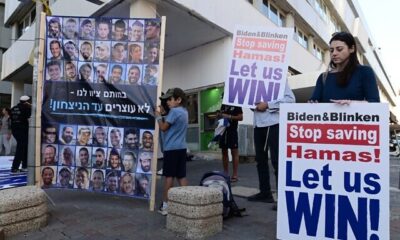
 Internacionaleshace 21 horas
Internacionaleshace 21 horasBiden es acusado de ayudar a Hamás mientras Israel está indignado por la amenaza de congelación de armas
-
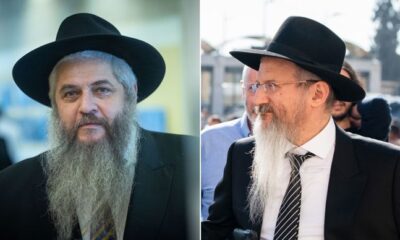
 Internacionaleshace 17 horas
Internacionaleshace 17 horasGuerra entre Rusia y Ucrania: el gran rabino de Moscú cargó con duras críticas contra su par ucraniano
-
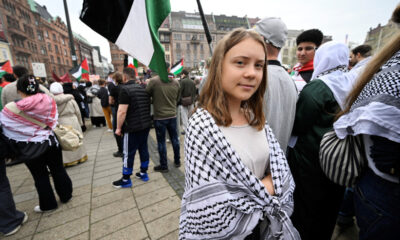
 Europa Newshace 14 horas
Europa Newshace 14 horasSuecia. La activista climática Greta Thunberg se une a las protestas pro palestinas antes de la semifinal del Eurovisión
-
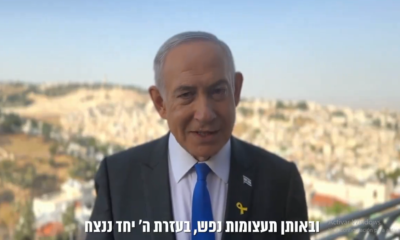
 Guerrahace 12 horas
Guerrahace 12 horasNetanyahu en elíptica respuesta a EE.UU.: «En la Guerra de Independencia había un embargo de armas contra Israel, pero ganamos»
-
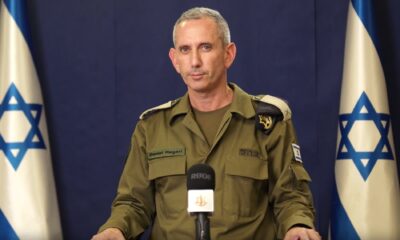
 Guerrahace 13 horas
Guerrahace 13 horasTras la amenaza de Biden, el portavoz del ejército israelí aseguró que tienen las armas necesarias para las próximas misiones, incluso en Rafah
-
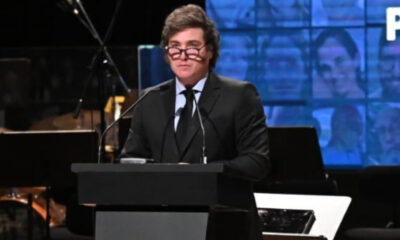
 Argentinahace 12 horas
Argentinahace 12 horasArgentina | Holocaust and Heroism Day. President Milei’s major speech against anti-Semitism and terrorism
-
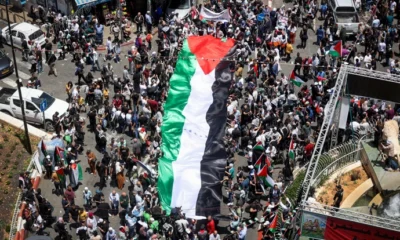
 Internacionaleshace 18 horas
Internacionaleshace 18 horasEslovenia, miembro de la Unión Europea, decidió reconocer un Estado palestino
-
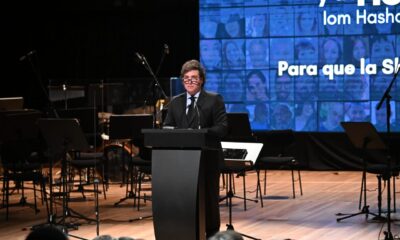
 Argentinahace 20 horas
Argentinahace 20 horasEn el Día del Holocausto, Milei anunció la postulación de Argentina para la presidencia de la IHRA




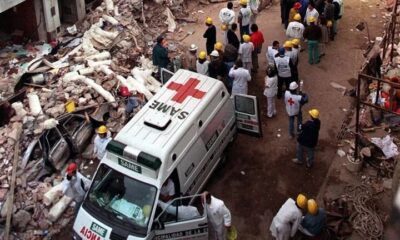

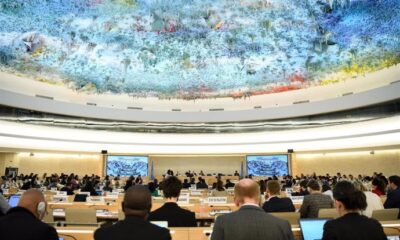

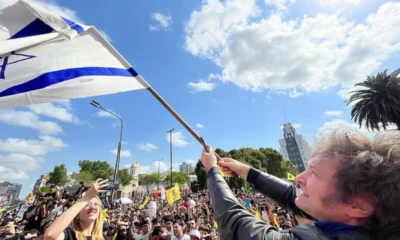

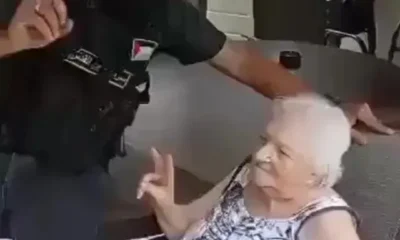

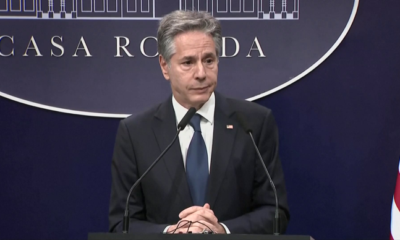







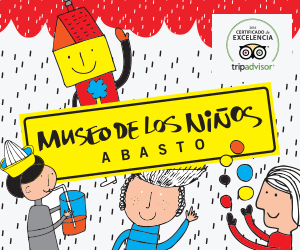
 Suscribite al Whatsapp!
Suscribite al Whatsapp!